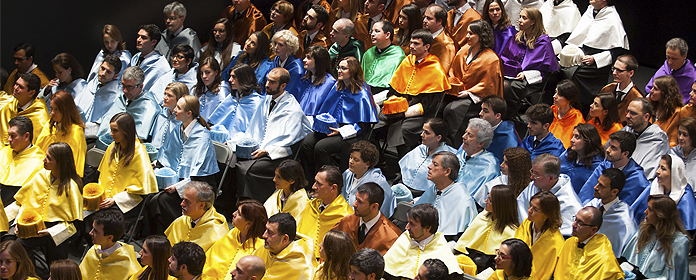Record year for doctoral inauguration ceremony at the University
In this course, 271 people from 23 countries have defended thesis

The University of Navarra has held its largest investiture ceremony for new doctors to date. A total of 271 people can now wear the biretta that distinguishes them as doctors on their specialization program of knowledge, 59% more than last year. The increase is explained by Royal Decree 99/2011, which extinguished the old doctorate programs: all current doctoral students follow the Bologna Plan, which organizes the European Higher Education space.
In total, since June 2015, 271 researchers from 23 countries and belonging to 15 Schools, schools and institutes have defended their thesis : 28 belong to the School of Engineering; 51 to School of Philosophy and Letters; 89 to Medicine; 23 to Sciences; 16 to Pharmacy and Nutrition; 11 to Theology; 12 to Communication; 11 to Architecture; 7 to Education and Psychology; 5 to Law; 6 to IESE; 3 to Canon Law2 to Ecclesiastics from Philosophy; 1 to Economics; and 5 to Nursing.
A "day of celebration" at the University of Navarra, as stressed by President, Alfonso Sánchez-Tabernero, in his congratulatory speech , delivered in the auditorium of the Museum. "We feel happy because you have reached a goal; and hopeful because that work well done is a promise of great fruits at the service of society," he stressed.
Sánchez Tabernero has quoted Christian Bobin to joke about the enormous task that the new doctors leave behind: "When I was preparing these words I was thinking that perhaps on the day you made the decision to do a thesis you were not aware of the effort it was going to involve. Fortunately. It is not for nothing that Bobin has written that they do not know what they are doing is the most intelligent sentence ever said".
He then reminded them of their fundamental role in the University: "For there to be an authentic institutional culture, it is not enough for the governing bodies to define precisely the identity and goals of the organization. What is really needed is for each member, each professor, to make the institutional purpose of the University his or her own. Only then will the theoretical identity be the real identity, expressed in the life of the organization," he reiterated.
Prof. Gómez-Montoro: work deadline and intellectual humilityÁngel J. Gómez-Montoro, professor of Law at School and sponsor of the graduating class, congratulated the new doctors for being able to experience "not a passing and superficial joy, but the deep and serene joy that only comes when you have achieved something very valuable and, at the same time, difficult to achieve". He also warned them that despite the challenge they have overcome today, they have before them a more ambitious one: "The activity in which the university mission statement is carried out in the fullest way: the generation of knowledge for transmission to future generations of students and to society in general".
To this end, he recommended work for a long deadline and intellectual humility, as well as the forging of a critical and personal way of thinking: "The research must seek the truth above all utilitarian approaches (...) this love of truth leads to honesty in one's own work, to think freely, without being dragged along by passing fads or by what has come to be called political correctness, and to seek the common good above one's own brilliance staff", he stressed in a speech dotted with quotes from El ingenioso hidalgo don Quijote de la Mancha, in tribute to the 400th anniversary of the death of Miguel de Cervantes.
The representative of the new doctors, Felipe Jiménez Berrio, thanked both the directors of thesis and the association of Friends of the University of Navarra for their financial aid: "Our efforts would have been useless, as we all know, if we had not had the guide of our teachers, who have made it possible for us to be here today". He also recalled the most difficult moments: "On many occasions, we have looked to the future and seen our objectives as unattainable undertakings," he acknowledged. "However, the desire to search for the truth, the thought that with our work we could contribute to the improvement of men and societies, encouraged our path and encouraged us to continue in the most arduous moments of our task," he stressed.




